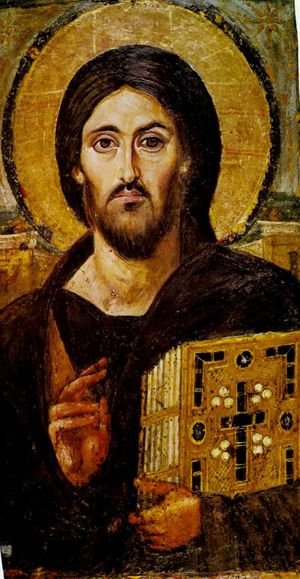Christ, the King: Difference between revisions
No edit summary |
No edit summary |
||
| Line 11: | Line 11: | ||
"Marana tha! Come, Lord Jesus!" (Rev). | "Marana tha! Come, Lord Jesus!" (Rev). | ||
"Christ" is not Jesus' name. His name outside of His hometown was "Jesus of Nazareth." In Nazareth, His name was "Jesus, son of Joseph." | "Christ" is not Jesus' name. His name outside of His hometown was "Jesus of Nazareth." In Nazareth, His name was "Jesus, son of Joseph." | ||
| Line 19: | Line 17: | ||
For the Jews in the [[TNK|Old Testament]], "Messiah" or "Christ" meant "King." This feast reminds us of that. It is the feast of "''The'' Christ, ''the'' King." | For the Jews in the [[TNK|Old Testament]], "Messiah" or "Christ" meant "King." This feast reminds us of that. It is the feast of "''The'' Christ, ''the'' King." | ||
For more details, see [http://www3.canisius.edu/~moleski/handouts/trouble%20with%20christ.pdf The Trouble with "Christ."] | |||
[[Category:Liturgical Year]] | [[Category:Liturgical Year]] | ||
Revision as of 17:05, 20 November 2010

Final feast of the Church's Liturgical Year.
Celebrates Jesus seated at the right hand of the Father, reigning in splendor, and preparing to come (advent) again in glory to judge the living and the dead.
The feast of Christ, the King, is overshadowed by Advent and Christmas. This is a great shame because it is the summit of the whole year--the point toward which everything is moving.
At the end of the liturgical year, we celebrate Jesus coming in glory at the end of everything.
"Comfort one another with these words" (1 Thess?).
"Marana tha! Come, Lord Jesus!" (Rev).
"Christ" is not Jesus' name. His name outside of His hometown was "Jesus of Nazareth." In Nazareth, His name was "Jesus, son of Joseph."
"Christ" is Jesus' office. "Christ" was a translation into Greek of the Hebrew word, "Messiah." Both "Christ" and "Messiah" mean "the man anointed to be King of Israel." It was also applied to the High Priest in the Temple.
For the Jews in the Old Testament, "Messiah" or "Christ" meant "King." This feast reminds us of that. It is the feast of "The Christ, the King."
For more details, see The Trouble with "Christ."